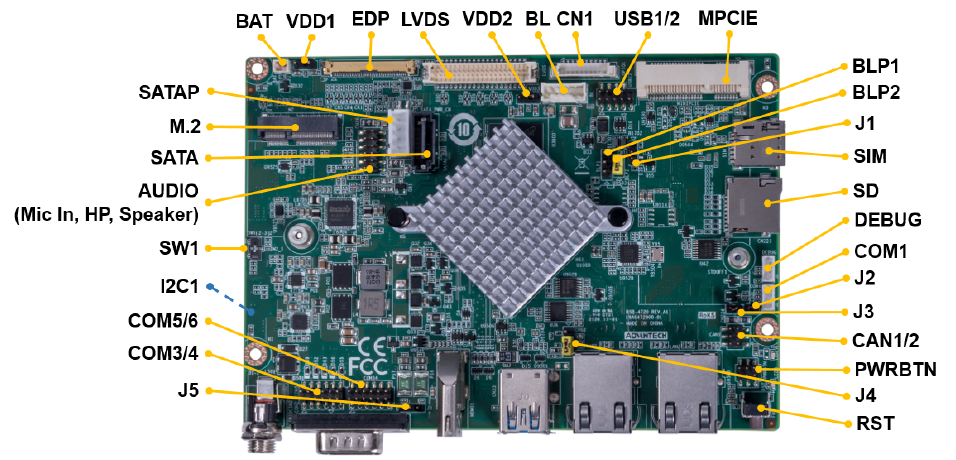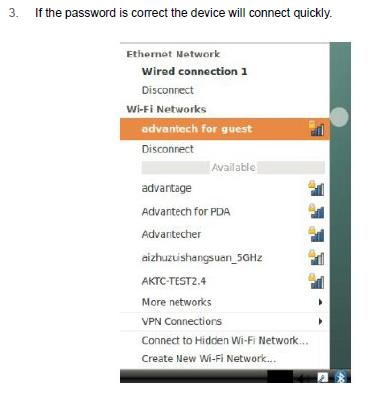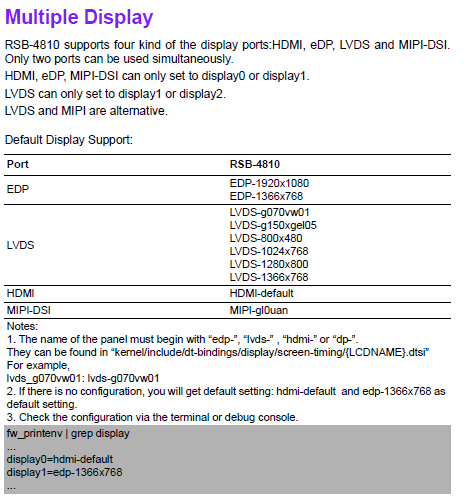RSB-4810 Android12 OS User Guide
Contents
- 1 資源特性(Features)
- 2 訂購資訊(Ordering Information)
- 3 接口布局和尺寸(Layout and Sizes)
- 4 Connector List
- 4.1 Jumper List
- 4.2 Connector List
- 4.3 快速入门 (Quick Start)
- 4.4 Android
- 4.5 Linux系统的基本使用(Linux System Basic Operating Method)
- 4.5.1 User Guide
- 4.5.2 乙太網路使用方法(Ethernent Testing Method)
- 4.5.3 WiFi使用方法(WIFI Testing Method)
- 4.5.4 4G使用方法(4G Testing Method)
- 4.5.5 蓝牙使用方法(BlueTooth Operating Method)
- 4.5.6 音訊使用方法(BlueTooth Operating Method)
- 4.5.7 CAN 測試( CAN Test method)
- 4.5.8 CANFD测试
- 4.5.9 I2C 測試( I2C Test method)
- 4.5.10 看門狗測試 (Watch Dog Test method)
- 4.5.11 UART測試 (UART Test method)
- 4.5.12 GPIO測試(GPIO Test method)
- 4.5.13 Display測試(Display Test method)
- 4.5.14 Mutiple Display:
- 4.6 How_to_Config_Multi-Display
- 4.7 通用方法(General Method)
- 4.8 How to build Android 12 BSP (Debian 10 BSP 編譯)
資源特性(Features)
- Rockchip RK3568 Arm Quad Cortex-A55, up to 2.0GHz
- Built-in NPU with processing performance of up to 0.8 TOPS
- Onboard 2/4GB LPDDR4 memory and 16/32GB eMMC
- Supports 1 x HDMI 2.0 4K, 1 x LVDS/MIPI-DSI, and 1 x eDP
- Supports 4K H.264/H.265 video decoder
- Provides 2 x GbE, 1 x SATA 3.0, 6 x UART, 2 x USB 3.0, 2 x USB 2.0, 1 x USB OTG, and 2 x CAN FD
- Provides a M.2 E Key with PCIE 3.0/USB 2.0/SDIO/UART signal for Wi-Fi 5/6 Modules, and a MINI-PCIE with PCIE 3.0/USB 2.0 signal for LTE/5G Modules
- Supports Linux and Android OS
訂購資訊(Ordering Information)
接口布局和尺寸(Layout and Sizes)
接口布局圖 Board Layout
接口尺寸 Board Dimension
Connector List
Jumper List
接口引脚定義 (Pin definitions)
| Jumper List | |
| J1 |
MASKROM mode select Short pin 12 and power on the RSB-4810 to enter MASKROM mode. Change back to pin 23 before click "Run" to flash image |
| J2 | CAN impedance matching |
| J3 | CAN impedance matching |
| J4 | OTG Mode selection, default USB3.0 host |
| SW1 | AT & ATX Mode Switch, default AT mode |
| BLP1 | LVDS BKL PWR 3.3V&5V level select, default 5V |
| BLP2 | LVDS BKL PWR 12V select |
| VDD1 | EDP VDD 3.3V &5V level select, default 3.3V |
| VDD2 | LVDS VDD 3.3V & 5V level select, default 3.3V |
| J5 | COM5,COM6 power 12/5V level select, default 5V |
Connector List
| AUDIO | Audio pin header (Headphone, Mic in, Speaker) |
| EDP | eDP CONN |
| LVDS | LVDS CONN |
| BL | LVDS Back light Control |
| SATA | SATA3.0 |
| MINIPCIE | MINI PCIe 52P |
| SIM | Nano SIM card |
| M2 | M.2 E-Key CONN |
| SD | Micro SD slot |
| PWRBTN | Power button and LED |
| DCIN1 | 12V DC jack |
| COM1 | RS-232 pin header |
| COM2 | RS-232 DB9 |
| HDMI | HDMI CONN |
| CAN1/2 | CAN FD CONN |
| USB1/2 | USB pin header |
| USB3/4 | USB Type A ((2 x USB3.0, the lower Type A connector can be configured to OTG by jumper setting)) |
| SATAP | SATA Power |
| LAN1 | LAN1 |
| LAN2 | LAN2 |
| BAT | RTC CONN |
| COM3/4 | COM3 and COM4 with RS-232 or RS-485 |
| COM5/6 | COM5 and COM6 with RS-232 |
| RST | Reset button |
| CN1 | GPIO CONN |
| I2C1 | I2C pin header |
快速入门 (Quick Start)
系统下载 (OS Download)
Note: LIV= Yocto Linux , UIV=Ubuntu , DIV = Debian , AIV = Android, LBV=BSP , LIV= Image
| Platform | Product | Image Version | Release Date | Release Version | Release notes | Image Download | BSP Download Tag | Test Report | Comment |
| RK3568 | RSB-4810 | V12017 | 2024/05/11 | Beta | Release_Note |
Baidu Password:a887 |
RK3568_S12_AIV12017.xml | Test Report |
- Alpha: Basic I/O function bring up by RD;
- Beta: Basic I/O function、performance and middleware verified by RD. Peripherals integrated;
- GA: Beta version by QE verification;
- RTM: Beta version by SI/Power/QE verification and pre-loaded;
How to update images .
There are three ways to update images:
Android:
Using_RKTool.
SD_update image.
Debian :
OS_update image. (TBD)
U-boot update image. (TBD)
Android
1. Change Tool language in config.ini, please change "Selected: to "2"
- 选择工具语言:Selected=1(中文)<--Chinese ;Selected=2(英文)<-- English
[Language] Kinds=2 Selected=2 LangPath=Language\
2. Connect USB Type-A to Type-A cable with RSB-4810 USB Type-A connector to host PC.
3. Change J4 to pin 1 & pin 2 OTG mode. (default is Pin 2 & Pin3)
4. Connect with Debug port
5. Power on the RSB-4810 and press “Ctrl+c” in the debug terminal to stop at u-boot
6. Type “rbrom” to reboot to MASKROM mode
7. Launch RKDevTool.exe as “Administrator” and confirm it shows “Found One MASKROM device”
8. Click “Run” to start flash image to target.
9. After flashing is finished, it will reboot automatically with the new OS. 
Linux系统的基本使用(Linux System Basic Operating Method)
User Guide
乙太網路使用方法(Ethernent Testing Method)
Command : ifconfig
WiFi使用方法(WIFI Testing Method)
4G使用方法(4G Testing Method)
蓝牙使用方法(BlueTooth Operating Method)
音訊使用方法(BlueTooth Operating Method)
CAN 測試( CAN Test method)
CANFD测试
备注:使用DQA测试脚本。(DQA测试过1、3、5、8M)
测试脚本链接:
I2C 測試( I2C Test method)
看門狗測試 (Watch Dog Test method)
UART測試 (UART Test method)
GPIO測試(GPIO Test method)
Display測試(Display Test method)
HDMI:
Mutiple Display:
How_to_Config_Multi-Display
遠程訪問及文件傳輸(Remote Access and File Transimmion)
查看主板IP位址 ( Chech IP Address ):
ID: root password:123456
通用方法(General Method)
=== 查看CPU温度(Check CPU Temperature) ===
root@xxxx:/# cat /sys/devices/virtual/thermal/thermal_zone0/temp 40000
# 或者直接以度爲單位顯示 echo $[$(cat /sys/class/thermal/thermal_zone0/temp)/1000]° >>> 40°
=== 查看CPU频率(Check CPU Frequency) ===
cat /sys/devices/system/cpu/cpu0/cpufreq/cpuinfo_cur_freq
>> 1200000
cat /sys/devices/system/cpu/cpu0/cpufreq/cpuinfo_max_freq
>> 1800000
=== 查看内存容量(Check Memory Capacity) ===
root@xxxx:/# busybox free -m
=== 查看存储容量(Check Storage Capacity) ===
root@xxxxx:/# busybox df -h
設置RTC (RTC Setting)
How to build Android 12 BSP (Debian 10 BSP 編譯)
Android BSP User Guide for rk3568 series 12 - ESS-WIKI (advantech.com.tw)






































